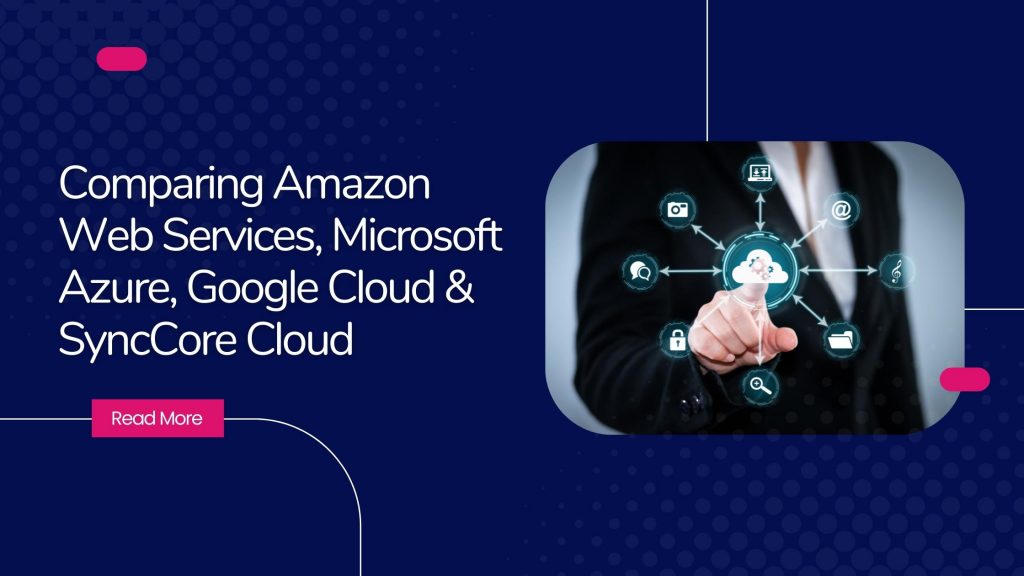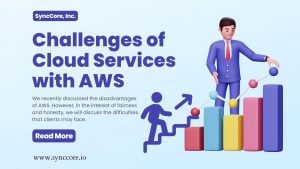Comparing Amazon Web Services: Cloud computing and platforms have grown in popularity over the last five years. These platforms have become an essential part of our lives, as w and many applications and businesses are aware. Due to this popularity and growing demand, many Cloud platforms have sprung up in recent years.
Many learners and business owners have questions about which service provider to use. In this article, we will compare AWS vs. Azure vs. Google Cloud vs. SyncCore Cloud, four of the best cloud service providers on the market.
Cloud computing is the internet-based delivery of computer system resources on demand for storage, applications, computing power, and other IT resources. The term “cloud computing” refers to the ability of users to access system resources from any location via the internet’s “cloud.” Instead of local servers, all user files and applications are stored on a network of remote servers.
Cloud computing is now used daily by any internet-savvy individual. Document editing, watching movies, listening to music, playing games, storing and accessing data, emails, and so on are extensuseuting. On the other hand, companies for application development, data storage and analysis, on-demand software delivery, website and blog hosting, and video and audio streaming.
Amazon Web Services (AWS), Microsoft Azure, Google Cloud Platform (GCP), and SyncCore Cloud are the four major platform providers in the cloud computing market. AWS is the market leader, with Azure, GCP, and SyncCore Cloud all growing steadily. Each of the four platforms has its own set of features that would meet the needs of an application developer.
Table of Contents
Introduction To AWS, Azure, Google Cloud & SyncCore Cloud

Amazon Web Services (AWS)
Amazon Web Services, or AWS as it is abbreviated, is one of the market’s leading Cloud Service providers. It was founded in 2002. It only provided a few sets of tools and services back then. Chris Pinkham and Benjamin Black presented a paper in 2003 that helped automate and revolutionise the AWS platform.
They believed that Amazon’s retail platform could serve a larger and more important purpose. This is when Amazon began to look at it from a broader business perspective, and by the end of 2004, we had services like Cloud Storage and Computation. Christopher Brown and his team were responsible for making this possible, and the Amazon EC2 service became popular around the world.
The popularity of AWS is inexplicable, and we will discover what makes this 170+ Cloud Service Provider so successful. Before we get there, let’s take a look at the Microsoft Azure Cloud Platform.
Microsoft Azure
Microsoft Azure is, as the name implies, Microsoft’s Cloud platform that allows you to test, build, deploy, and even manage applications hosted in Microsoft Azure’s data centres or Availability Zones. It, like AWS, offers all three service model solutions: infrastructure as a service, platform as a service, and software as a service. It enables you to integrate with various open source and Microsoft Stack products/tools, as well as programming languages.
It was announced in 2008, but it wasn’t released until February 1, 2020, as Windows Azure, before being renamed Microsoft Azure.
Azure, like AWS, provides a variety of products and solutions for app developers. The Azure platform provides adequate processing and computing power. It can deploy and manage virtual machines at a large scale. Azure can also perform large-scale “parallel batch computing,” which it shares with AWS over the Google Cloud Platform.
Google Cloud Platform (GCP)
Google Cloud Platform (GCP), also known as Google Cloud, launched its first public cloud service, Google App Engine, in 2008. It was Google Cloud’s first Platform as a Service offering. Following that, Google made various cloud services available to the public. These services are hosted in the same cloud space as popular Google services such as Google Search, YouTube, and Gmail.
Google is well-known for its services in Machine Learning, Data Analytics, Compute, Storage, and other areas.
Targeted Audience and Customers
Users and customers of AWS, Azure, Google Cloud, and SyncCore Cloud are all well-known. Let us now examine those.
Amazon Web Services
Amazon Web Series has the largest community support and customer base, as well as many high-profile customers. We have, to name a few,
- McDonald’s
- Netflix
- Unilever
- Samsung
- MI
- AirBnB
- BMW
- ESPN
Companies such as Netflix and LinkedIn invest $10-19 million per month in their instances. This demonstrates how much trust people have in this platform, as well as how large and prominent the customer base is. It also has a large customer base in the small scale industry.
Microsoft Azure
In this race, Microsoft Azure is not far behind. It also has a large customer base and has gained widespread acceptance in the majority of the Fortune 500 companies. Microsoft Azure is used by roughly 70-80 percent of Fortune 500 companies. Some well-known brands that use this platform include:
- Ebay
- Apple
- Pixar
- HP
- Honeywell
Google Cloud Platform
Google Cloud is the youngest of the four and has a smaller customer base than the others. But don’t forget that Google Cloud is home to YouTube and Gmail, both of which are massive in their own right. Here is a list of some of their other well-known clients:
- HSBC
- Snapchat
- HTC
- Phillips
SyncCore Cloud
Synccore Cloud is designed with security as the top priority. For maximum protection, use a dedicated firewall, VLAN, and the option to block top spamming countries on the firewall. Use a secure VPN or site-to-site tunnel to connect to your cloud workload. SyncCore Cloud Services has the most community support and customers, as well as a large number of high-profile clients. To name a few, we have
- Dun and Bradstreet
- Ashok Leyland
- Airtel
- Hindware
- Patanjali
- Himalaya
Miscellaneous Comparison
We have already compared these platforms on a number of pointers; however, there are a number of other pointers on which these platforms can be compared.
Here’s an overview of various comparisons. Start with Amazon Web Services.
Amazon Web Services
What distinguishes Amazon Web Services? For starters, it has a head start, which means it has had those extra valuable years to solidify its market dominance. This is supported by facts. Amazon Web Services has been the market leader in terms of market share in the IaaS services it provides, and Gartner data backs up that claim.
Another reason for its success is the number of services it offers; it nearly doubles the services offered by the second-best competitor in terms of sheer number of services. It is a highly mature platform that can meet a variety of enterprise-level requirements. It also possesses extensive and precise capabilities.
But everything has flaws. Amazon is expensive for short-term investments, and many people are hesitant to use it due to the uncertainty of its pricing models. However, the wide range of services it offers compensates for the pricing concerns. Certainly, Amazon’s advantages outweigh its disadvantages.
Let us now look at how Microsoft Azure performs in terms of its strengths and weaknesses.
Microsoft Azure
Microsoft is a company that has overcome numerous challenges in the IT and software industries. This capability has also permeated its Cloud offerings.
Microsoft has always had a stronghold and contributed to the market for on-premise services. It has ensured that the services and offerings it provides are cloud-compatible and can be moved to the cloud. Despite a late start, it is making up for lost time at a rapid pace.
Another major reason why Microsoft Azure is so popular and widely used is that it easily integrates with the majority of the Microsoft stack of products. As a result, many businesses and enterprises consider migrating to Microsoft Azure because the deployment appears to be simple and straightforward.
Microsoft Azure is advertised as being enterprise-ready. However, one of the shortcomings that people or customers complain about is the shortcomings it has when it comes to supporting enterprise-level experience. Customers also complain that it is a little short.
Let us see how this platform fares compared to others, and what are its pros and cons.
Google Cloud Platform
Let us start by taking a look at its strengths first.
Let us begin by examining its strengths first. It has fairly strong container offerings, a Kubernetes standard, and high computation capabilities in terms of Big Data Analytics and even Machine Learning. It also provides adequate load balancing and scalability.
When compared to Amazon Web Services, Microsoft Azure, and SyncCore Cloud, it falls short in terms of market share and number of services.
SyncCore Cloud
It provides on-demand cloud computing services and APIs to its clients. SyncCore is a platform that provides backup & disaster recovery, database storage, virtual desktop, cloud Iaas, and other functionalities to its clients and users.
SyncCore is available in 6 Countries: EUA, Canada, South Africa, UAE, Singapore, and India, and New York City is the primary data center.
SyncCore Cloud is the first autonomous cloud platform. SyncCore is a cloud revolution for SMEs and Enterprise Companies. It provides low-priced cloud computing services to help your organisation meet its business challenges, giving it an advantage over Azure, AWS, IBM, and GCP in the market.
Conclusion
Cloud computing has caused a revolution in the IT industry. It has become a go-to factor for all companies, large and small, for application implementation and hosting. According to a Gartner Survey Report, the public cloud market is expected to reach $411 billion by 2020.
Our Recommendation
The needs and understanding of the service’s features and pricing will determine which option is best for your company.
For businesses, selecting the right cloud vendor is critical. In today’s Cloud strategy, SyncCore provides a hybrid solution, PaaS, and a variety of other essential capabilities. Many businesses have increased their revenue by migrating to SyncCore Cloud.
SyncCore is a far better alternative to GCP, AWS and Azure. If you require cloud services, please contact us at [email protected] or visit our website at www.synccore.io.
Read More:
Top 3 Google Cloud Storage Alternatives 2022
Competitors and Alternatives Amazon Web Services (Top Best 5)



